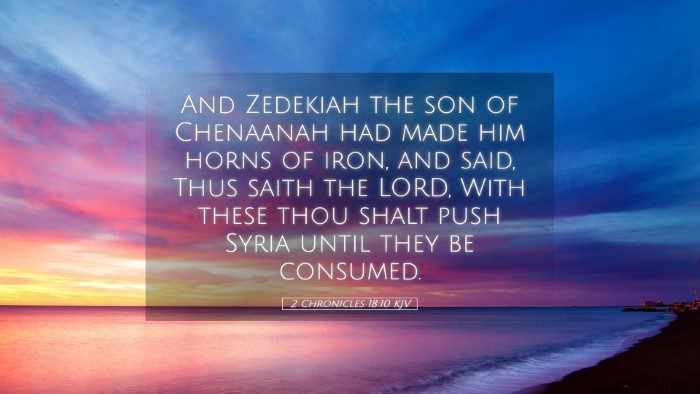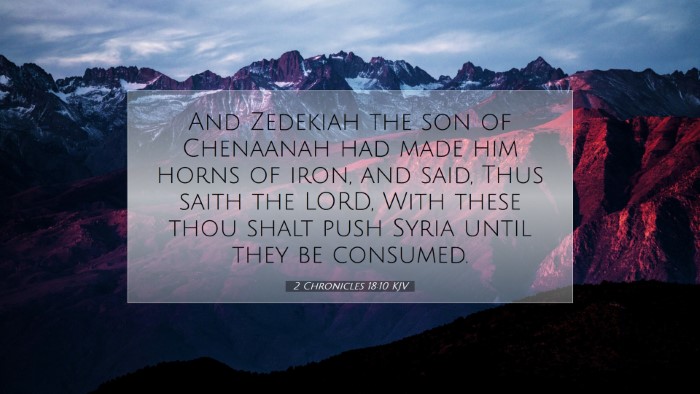Commentary on 2 Chronicles 18:10
The verse reads:
"And Zedekiah the son of Chenaanah had made him horns of iron: and said, Thus saith the Lord, With these thou shalt push Syria until they be consumed." (2 Chronicles 18:10)
Context and Background
This passage is set within a broader narrative that chronicles the reign of King Jehoshaphat of Judah and his alliance with Ahab, king of Israel. It emerges from a series of events leading up to the battle against Ramoth-gilead, where Ahab sought counsel from prophets regarding the outcome of the engagement. The context highlights the dichotomy between the true prophets of God and false prophets, a theme that prevails throughout the biblical text.
Insights from Matthew Henry
Matthew Henry emphasizes the theatrical presentation of Zedekiah, who embodies the spirit of false prophecy. He notes that Zedekiah’s act of making iron horns symbolizes the aggressive and forceful nature of the prophecies proffered by Ahab’s court. This dramatic imagery suggests a fervent zeal not rooted in divine truth but rather in the flattering desires of the king.
Henry notes that the prophets present before King Ahab spoke unanimously, but they lacked the spirit of genuine prophecy. The emphasis on "pushing Syria until they be consumed" presents not only a promise of victory but also reflects the hubris of Ahab who, despite numerous warnings from true prophets like Micaiah, chose to align with those who assured him of success.
Insights from Albert Barnes
Albert Barnes provides a critical examination of Zedekiah's role in this narrative. He points out that the use of iron horns symbolizes strength and power, reflecting the war-like ambitions of Ahab. Barnes elaborates on the infallibility of divine counsel contrasted with the human inclination to seek prophecies that align with their own desires. The horns represent not just instruments of physical battle, but also the false confidence instilled among the people and their leaders in relying on erroneous declarations.
He underscores the significance of the prophetic role, warning that not all who claim to speak on behalf of God are true messengers of divine will. Barnes suggests that the fate of those who follow Zedekiah’s counsel—rooted in falsehood—serves as a cautionary tale, illustrating the perils of neglecting true, God-given guidance in favor of popular sentiment.
Insights from Adam Clarke
Adam Clarke examines the dramatic representation of Zedekiah's “horns” not just as bold declarations, but as manifestations of false security. Clarke emphasizes that the theatricality signifies the manipulation of prophetic speech for self-serving purposes. He describes the act of prophecies that are crafted to please the ear yet are devoid of divine endorsement.
Clarke insists on the grave consequences of Ahab’s choice to ignore the counsel of Micaiah, a true prophet who foretold disaster. The horns—while symbolic of victory—are ironically also emblematic of the impending doom, reflecting how false assurances can lead to dire consequences. He emphasizes the necessity for discernment in distinguishing the voice of God amidst the clamor of popular opinion.
Theological Implications
This passage raises important theological questions about the nature of prophecy and the discernment required to identify true messages from God. It serves to remind pastors, theologians, and scholars of the historical and ongoing complexities of prophetic authority. The stark contrast between true and false prophets mirrors contemporary challenges in ecclesiastical settings, where the pressure to conform to popular sentiments can overshadow genuine biblical guidance.
Application for Today
For contemporary application, the account serves as a critical reminder for Christian leaders and congregants alike to cultivate discernment. It calls for an engagement with Scripture that goes deeper than surface-level interpretations and challenges individuals to seek the counsel of biblically grounded leaders.
- Discernment in Leadership: Church leaders must strive to seek and proclaim God's truth over popular opinion.
- Valuing True Prophecy: Believers should learn to value and discern the messages that come from true prophets of God, aligning their lives with divine will rather than human ambition.
- Consequences of False Assurance: Just as Ahab faced dire consequences for his choices, Christians today are cautioned to weigh the teachings they receive carefully and ensure they stem from the truth of Scripture.
Conclusion
2 Chronicles 18:10, through the ministerial insights offered by Matthew Henry, Albert Barnes, and Adam Clarke, highlights the stark realities of prophetic ministry and the requirements for discerning God's voice amid cultural pressures. As believers engage with Scripture, it is paramount that they commit to listening diligently to God's authentic prophetic messages, reflecting on the weighty implications of their choices in leadership and discipleship.


